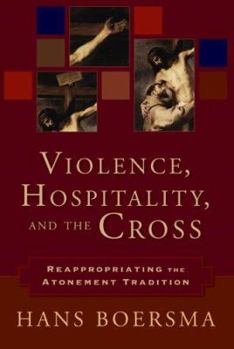Violence, Hospitality, and the Cross: Reappropriating the Atonement Tradition
Select Format
Select Condition 
Book Overview
The cross is central to understanding Christian theology. But is it possible that our postmodern setting requires a new model of understanding the cross? Hans Boersma's Violence, Hospitality, and the Cross proposes an understanding of the atonement that is sensitive both to the Christian tradition and to the postmodern critiques of that tradition. His fresh approach draws on the rich resources of the Christian tradition in its portrayal of God's hospitality in Jesus Christ.
Format:Paperback
Language:English
ISBN:0801031338
ISBN13:9780801031335
Release Date:April 2006
Publisher:Baker Academic
Length:288 Pages
Weight:0.92 lbs.
Dimensions:0.8" x 6.4" x 8.9"
Customer Reviews
2 ratings
An excellent read regarding the Atonement
Published by Thriftbooks.com User , 17 years ago
This book gives an ecumenical overview of the three traditional views of the atonement: Moral-Influence, Penal-Substitution, and Christus-Victor. With much reliance on St. Irenaeus, Boersma approaches the topic from a Reformed view but holds value in all traditions. He discusses ideas regarding the relationship between violence and hospitality from modern and patristic levels. A bold book in the face of the political and theological challenges of today, Boersma does a fine job at portraying an ecumenical Reformed approach. I highly recommend this book.
Excellent Introduction to an Important Discussion
Published by Thriftbooks.com User , 20 years ago
Boersma's volume represents an extremely helpful introduction to an important theological discussion and a welcome reappropriation of the traditional Reformation-era penal substituition theory. A couple of issues to ponder as you read: I am still mulling over the particulars, but I'm not sure if Boersma does sufficient justice to the divinity of Jesus and the cross as God's "self"-offering. Historically, the penal-substitution theory can tend to emphasize too much God's violence against Jesus as "other" to the neglect of the ontological unity of Father, Son, and Spirit. Second, by starting with a philosophical analysis of "hospitality" drawn from Levi-Strauss, Derrida, Levinas, et.al, Boersma risks the imposition of non-biblical concepts of hospitality on the biblical text. This is not necessarily the case, but I am concerned that contemporary modernist/postmodernist agendas not drive this debate as much as Scripture and Tradition. While interacting with contemporary thought, theology must retain its integrity as a distinctive language game with a unique grammar and vocabulary. Likewise with Boersma's employment of the munus triplex christi as a macroscheme to reconcile moral influence, Eastern (Christus Victor), and Western (Penal) concepts of the Atonement. This manner of composing Christology, while being rooted biblically, is a 16th Century strategy of John Calvin. Hence the reconciliation of biblical, patristic, and Medieval data under this rubric seems potentially anachronistic. That said, however, the Church should welcome Boersma's relatively new theological voice. As a Reformed evangelical, he is to be particularly commended for integrating Roman Catholic, Orthodox, anabaptist, and pentecostal voices into his treatment of the discussion. While not uncritical of his own Dutch-Calvinist heritage (note his discussion of Canon #3 of Dordt), Boersma displays it in its best and most catholic light and successfully overcomes the confessional inbreeding that plagues most conservative Presbyterian and Reformed theologians. Warmly recommended reading!






